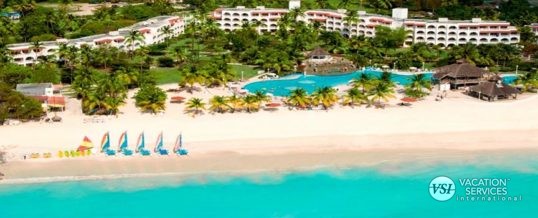
Antigua
All the signs pointed towards Antigua. The largest of the British Leeward Islands had warm, steady winds, a complex coastline of safe harbours, and a protective, nearly unbroken wall of coral reef. It would make a perfect place to hide a fleet. And so in 1784 the legendary Admiral Horatio Nelson sailed to Antigua and established Great Britain’s most important Caribbean base. Little did he know that over 200 years later the same unique characteristics that attracted the Royal Navy would transform Antigua into one of the Caribbean’s most sought after destinations.
The signs are still there, they just point to different things. The Trade Winds that once blew British men-of-war safely into English Harbour now fuel one of the world’s foremost maritime events, Sailing Week. The expansive, winding coastline that made Antigua difficult for outsiders to navigate is where today’s trekkers encounter a tremendous wealth of secluded, powdery soft beaches. The coral reefs, once the bane of marauding enemy ships, now attract snorkelers and scuba divers from all over the world. And the fascinating little island of Barbuda — once a scavenger’s paradise because so many ships wrecked on its reefs — is now home to one of the region’s most significant bird sanctuaries.
Antigua is the largest of the British Leeward Islands at about 14 miles long and 11 miles wide, encompassing 108 square miles. Its highest point is Boggy Peak (elevation 1,319 feet), located in the south western corner of the island. The current population for the nation is approximately 68,000 and its capital is St. John’s.
Where is Antigua?
Antigua (pronounced An-tee’ga) is located in the middle of the Leeward Islands in the Eastern Caribbean, roughly 17 degrees north of the equator. To the south are the islands of Montserrat and Guadaloupe, and to the north and west are Nevis, St. Kitts, St. Barts, and St. Martin.
Our Beautiful Weather
Temperatures are usually warm in Antigua. Daytime readings range 75-80 F (25-30 C) and nights are cooler by about 10 F (5 C). The islands’ tropical climate is moderated by fairly constant northeast trade winds, and there is little precipitation, because of the islands’ low elevations. In general, the wettest period is September through November. The low rainfall and constant easterly breezes create one of the most pleasant climates in the West Indies. An exception is hurricane season (July-October), when it’s cloudier, hotter and more humid. However, unless there’s actually a hurricane in the neighbourhood, even that season is very pleasant.
Antigua Travel Tips
Passports & immigration
Travel to Antigua requires a valid passport with validity of 6 months past the date of departure from Antigua. Visas are not required for UK, US, Canadian and most European nationalities. For visa information from your country of origin please contact your local embassy or passport office.
Gratuities and tipping
At our all-inclusive resort tipping is not required. However, you may provide staff members with a tip for excellent service should you so desire.
Departure taxes & service charges
Antigua’s departure tax are typically included in your airline ticket. Sales Tax of 12.5% and statutory service charge of 10% are included in your all-inclusive booking at Jolly Beach Resort & Spa.
Electricity
The resorts predominantly use 110V, the same as you would find in North America.
Appropriate attire
The island of Antigua is wonderfully and casually elegant. Beach attire is perfect for pools and beach but not for town shops and restaurants.
Time zone
Antigua is in the Atlantic Standard Time zone, four hours behind Greenwich Mean Time (GMT).
Currency
The official currency of Antigua is the Eastern Caribbean dollar which is fixed to the US dollar at a ratio of US $1.00 to EC $2.6882.
The U.S. dollar is widely accepted by most merchants, including hotels, restaurants, and car rental companies, but change is often given in Eastern Caribbean dollars.
Major credit cards and traveller’s cheques are widely accepted, but small vendors and locally owned establishments may only accept cash. ATMs can be found in the airport and at island banks, which include the Bank of Antigua, Barclays Bank PLC, and the Royal Bank of Canada. Please be advised that many hotels and business in Antigua do not accept American Express.
Banking
-
Antigua and Barbuda Development Bank
-
Antigua Commercial Bank
-
Bank of Nova Scotia
-
First Caribbean International Bank, Ltd
-
RBTT Bank, Ltd
-
Royal Bank of Canada
